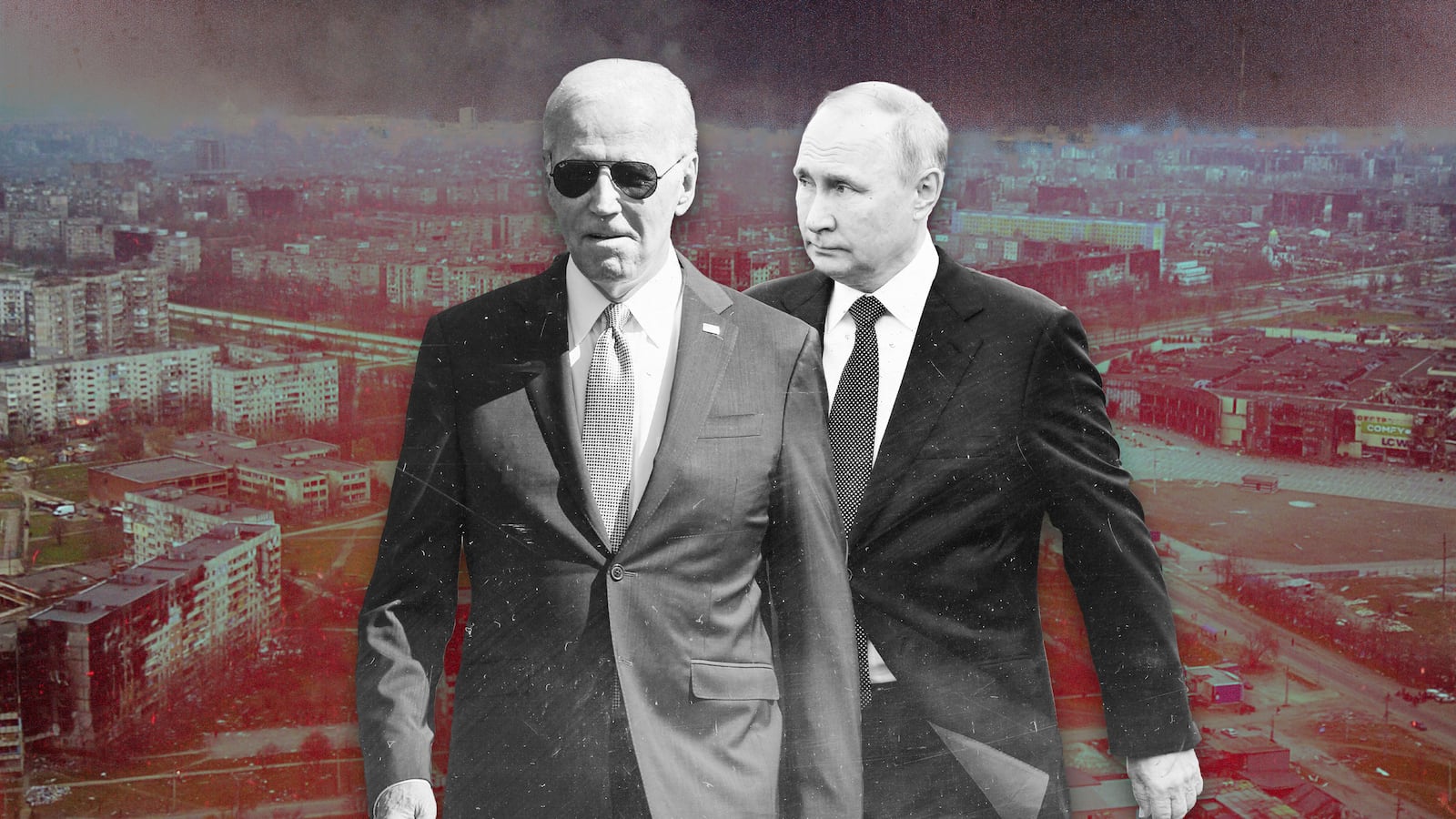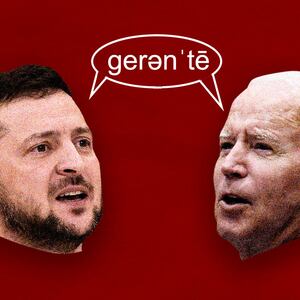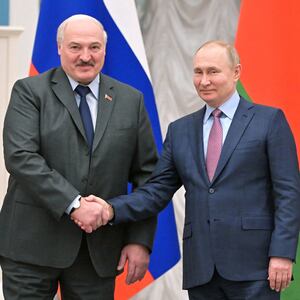U.S. officials have been warning for weeks now that Russia is preparing to conduct sham referenda in Ukrainian territories Russian forces have seized. But what was once a future concern is now a present danger as two U.S. officials told The Daily Beast, who cautioned the potential referendum—or multiple referenda, one for each occupied territory—could happen as early as October. The Crimea-esque step by the Russians will likely pose a key test of whether the Biden administration has learned anything from Russia’s Ukraine takeover playbook.
The sources said that members of the U.S. intelligence community are currently speculating that the referenda could take place on or near Defenders Day on Oct. 14, a major Ukrainian public holiday that was first created in response to the invasion and occupation of Crimea and which honors the country’s armed forces and veterans.
"We expect Russia to try to manipulate the results of these referenda under the false claim of the Ukrainian people wanting to join Russia. It will be critical to call out and counter this disinformation in real time," John Kirby, a White House National Security Council coordinator, said last week.
But the potential Russian power plays aren’t just a test of the Biden administration’s resolve to stand up in the face of disinformation. For President Biden—who was the chief Ukraine envoy as vice president during the Obama administration when Russia seized Crimea and ran a sham referendum on it—it’s personal.
Behind closed doors in 2015, when the Obama administration was working on a response to Russia’s invasion of eastern territories in Ukraine as well as the invasion and illegal annexation of the Crimean peninsula, a group of former senior officials with Ukraine areas of responsibility from the Departments of State and Defense sat down with Biden to brief him on Ukraine’s needs months after the 2014 invasion and referendum on Crimea. Two sources present for the conversations said Biden expressed interest in sending Ukraine lethal weapons to try to respond more sharply to Russia. But President Barack Obama put the kibosh on it.
The group of senior officials had just traveled to Ukraine to get a sense of the Ukrainians’ needs, according to John Herbst, a former U.S. ambassador to Ukraine. After hearing that most of their weaponry traced its origin back to the Soviet era, the group recommended the United States step in with lethal aid, including with javelins, or anti-tank weapons.
“A group of former officials took a trip to Brussels, to NATO, and to Ukraine—including to the front—and came back and published a report arguing we had to arm Ukraine. We listed the things that we should send, including especially Javelin anti-tank missiles, and also counter battery radar for missiles, which enables you to detect incoming missile fire and to launch a counter strike,” Herbst told The Daily Beast. “In the meeting with him at his residence, the Naval Observatory, he said, you know, ‘Guys, I'm with you, but the big guy is leaning the other way.’”
Steve Pifer, another former U.S. ambassador to Ukraine who also attended the briefing, had the same takeaway.
“When we had a chance to talk with the Vice President, he was very clear. This was not his. This was going to be a decision for the president. And he was also very clear [that] I cannot preempt the President,” Pifer told The Daily Beast.
“We all came away from that discussion with him thinking that the Vice President personally was going to recommend privately to the President that we provide lethal assistance,” Pifer said.
Fast-forward seven years later, and six months into the war that Russia launched in February Biden finds himself facing off with another flashpoint, and another potential series of referenda. But this time, he’s the commander-in-chief.
But U.S. officials told The Daily Beast they harbor concerns that the Biden administration’s current plans to respond to any sham referenda in Ukraine are not enough to punish Russia to deter them from future Ukrainian land grabs.
“The question that has yet to be answered by anybody is, what is a proportionate response to the illegal seizure of one-fifth of an ally’s territory?” one senior U.S. official told The Daily Beast. “Russia waited seven years after annexing Crimea to mount another pretext-less invasion of Ukraine—without a proportionate response, whatever that looks like, there is no disincentive to discourage them from another invasion seven years from now.”
Without a firmer response Biden could run the risk of allowing or precipitating a new global norm: one in which Russia, or other nations, wage war by simply by just taking a fraction of another nation’s territory every few years, backing off when global attention simmers, and picking up again to take another fraction of the territory a decade later.
One response under discussion, one U.S. official told The Daily Beast, would be supporting Ukraine’s entry into the North Atlantic Treaty Organization (NATO). Ukraine’s membership in NATO would entitle it to protection under NATO’s Article V, which stipulates that if any NATO member is under armed attack, every other member will treat it as an attack on their own nation.
The Biden administration has stated in the past that it supports NATO’s so-called “open door policy,” which allows for membership by any European nation willing to “contribute to the security of the North Atlantic area” and uphold the organization’s principles of democratic governance. But Biden has personally been less inclined to support the alliance’s expansion to include Ukraine, telling reporters last summer that strategy “is out on that question.”
NATO membership, however, presents potentially major complications—U.S. support for Ukraine would not guarantee membership. Ukraine would need unanimous support from current members.
Volodymyr Zelensky, Ukraine’s president, has stopped short of directly calling for Ukraine to join NATO, but has repeatedly begged for security guarantees from the alliance—especially after past efforts to describe security “assurances” between the United States and Ukraine haven’t gone smoothly and have led to major clashes of opinion on what the United States is willing to provide Ukraine when its borders are breached.
One U.S. official suggested Ukraine could be designated a major non-NATO ally, which would grant access to certain military equipment, economic programs, and partnerships with the Pentagon—but does not entail reciprocal defense obligations.
“EU membership is out of our hands, and to a certain extent, so is NATO membership,” one U.S. official said, ticking off potential recourse for a Russian-backed referendum in the occupied territories. “Designating Ukraine a major non-NATO ally is something that can’t be out-voted or out-politicked.”
Rose Gottemoeller, the former U.S. undersecretary of state for arms control and international security, told The Daily Beast she thinks the response to 2014 ought to have been more ironclad back then, to try to prevent Russia’s invasion now.
”Where the failure came in was us not responding sharply enough in 2014. I wish, now looking back, if I have any regret from my own time, as under secretary of state for arms control and international security, it was that we did not respond more sharply,” Gottemoeller told The Daily Beast. “That obviously was warning bells going off.”
At a minimum, if Russia goes through with the referenda in the near future, the response from the United States has to include harsh sanctions and announcements that the United States won’t recognize the territories as Russian, Herbst said.
Biden could also step up military transfers to Ukraine in a more strategic way.
“The most important thing the U.S. and the West has to do… is provide substantially more weapons to Ukraine. We are sending a lot, it’s true,” Herbst said. “But we are way too reticent, timid in sending more capable advanced weapons, such as fighter jets and MiGs [aircraft] the Ukrainians have been requesting since February, such as longer-range artillery… of the HIMARS [rocket systems] we’re sending.”
“The administration is too timid to do that,” Herbst said.









